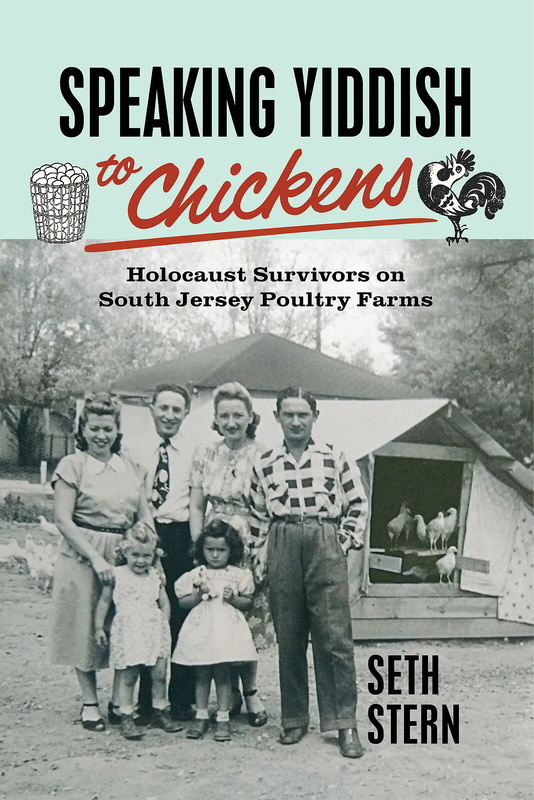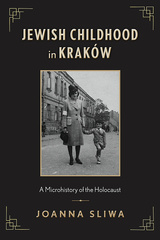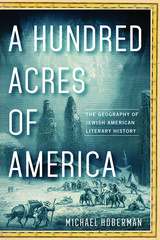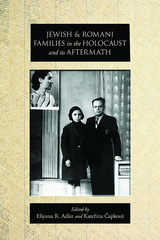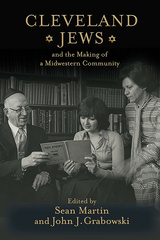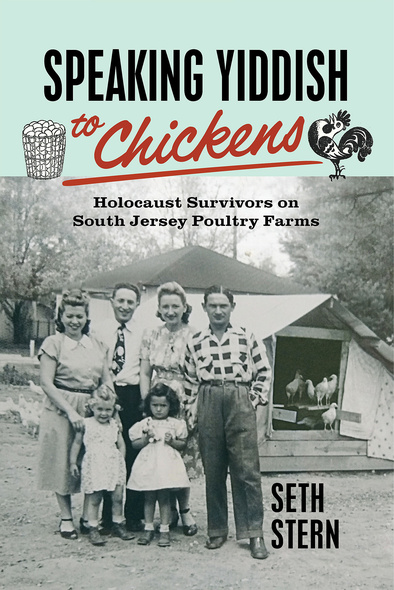
288 pages, 6 x 9
Paperback
Release Date:17 Mar 2023
ISBN:9781978831612
Hardcover
Release Date:17 Mar 2023
ISBN:9781978831629
Speaking Yiddish to Chickens
Holocaust Survivors on South Jersey Poultry Farms
By Seth Stern
Rutgers University Press
Most of the roughly 140,000 Holocaust survivors who came to the United States in the first decade after World War II settled in big cities such as New York. But a few thousand chose an alternative way of life on American farms. More of these accidental farmers wound up raising chickens in southern New Jersey than anywhere else. Speaking Yiddish to Chickens is the first book to chronicle this little-known chapter in American Jewish history when these mostly Eastern European refugees – including the author’s grandparents - found an unlikely refuge and gateway to new lives in the US on poultry farms. They gravitated to a section of south Jersey anchored by Vineland, a small rural city where previous waves of Jewish immigrants had built a rich network of cultural and religious institutions.
This book relies on interviews with dozens of these refugee farmers and their children, as well as oral histories and archival records to tell how they learned to farm while coping with unimaginable grief. They built small synagogues within walking distance of their farms and hosted Yiddish cultural events more frequently found on the Lower East Side than perhaps anywhere else in rural America at the time. Like refugees today, they embraced their new American identities and enriched the community where they settled, working hard in unfamiliar jobs for often meager returns. Within a decade, falling egg prices and the rise of industrial-scale agriculture in the South would drive almost all of these novice poultry farmers out of business, many into bankruptcy. Some hated every minute here; others would remember their time on south Jersey farms as their best years in America. They enjoyed a quieter way of life and more space for themselves and their children than in the crowded New York City apartments where so many displaced persons settled. This is their remarkable story of loss, renewal, and perseverance in the most unexpected of settings.
Author Facebook page (https://www.facebook.com/YiddishtoChickens)
This book relies on interviews with dozens of these refugee farmers and their children, as well as oral histories and archival records to tell how they learned to farm while coping with unimaginable grief. They built small synagogues within walking distance of their farms and hosted Yiddish cultural events more frequently found on the Lower East Side than perhaps anywhere else in rural America at the time. Like refugees today, they embraced their new American identities and enriched the community where they settled, working hard in unfamiliar jobs for often meager returns. Within a decade, falling egg prices and the rise of industrial-scale agriculture in the South would drive almost all of these novice poultry farmers out of business, many into bankruptcy. Some hated every minute here; others would remember their time on south Jersey farms as their best years in America. They enjoyed a quieter way of life and more space for themselves and their children than in the crowded New York City apartments where so many displaced persons settled. This is their remarkable story of loss, renewal, and perseverance in the most unexpected of settings.
Author Facebook page (https://www.facebook.com/YiddishtoChickens)
I grew up Jewish on a chicken farm. This book gets it right...Stern not only pinpoints the economic hardships and social dislocation the survivors experienced...The beauty of Speaking Yiddish to Chickens lies in Stern’s skill at conveying the ups and downs of some 1,000 survivors, each with their unique hardscrabble story.
'Speaking Yiddish to Chickens is much more than one man’s story about his grandparents. Stern’s journalistic expertise allows him to broaden his scope, deftly layering different perspectives and narratives throughout the book.'
Seth Stern has created a nuanced, sensitive, and even affectionate account of an important, albeit neglected, outgrowth of the Jewish diaspora in North America. It will be of great interest to anyone who has a personal, social, or academic interest in the postwar period, oral history, and/or post-Holocaust immigration.
Speaking Yiddish to Chickens is attentive to the ways in which Holocaust survivors who took up poultry farming in Vineland built upon the achievements of their Jewish predecessors. Stern's individual stories are easy to follow, upbeat, and colorful. Stern is a seasoned and skilled journalist.’
Seth Stern skillfully brings to life a remarkable chapter in the little-known history of modern Jewish farming in the Diaspora. Lovingly written, Speaking Yiddish to Chickens travels with Stern’s grandparents and other European Jews from the horrors of the Holocaust to new lives in and around Vineland, New Jersey’s poultry farms, where these survivors healed their wounds and embarked upon their American journeys. Through meticulous research, Stern captures the extraordinary cooperation between the American government, Jewish philanthropic agencies, and the farmers themselves who made this bold experiment possible.
SETH STERN is a legal journalist and editor at Bloomberg Industry Group. He previously reported for Bloomberg News, Congressional Quarterly, and the Christian Science Monitor. He co-authored Justice Brennan: Liberal Champion. He is a graduate of Harvard Law School, the Harvard Kennedy School, and Cornell University.
Author’s Note
Prologue
1 Passage
2 New York
3 Finding a Farm
4 Settling In
5 Small-Town Jews
6 Word-of-Mouth Migration
7 Mixed Reception
8 Getting Noticed
9 Vicissitudes
10 Comfort Zones
11 Community Building
12 New Connections
13 Family and Friends
14 Downturn
15 Rural Childhoods
16 Hurricanes
17 Coping
18 Grief and Faith
19 Feed Men and a Record-Breaking Hen
20 Laborers
21 The Golden Egg
22 Seeking Help
23 Alternative Livelihoods
24 Teenagers
25 Valedictory
26 After Farming
Postscript
Acknowledgments
Notes
Index
Prologue
1 Passage
2 New York
3 Finding a Farm
4 Settling In
5 Small-Town Jews
6 Word-of-Mouth Migration
7 Mixed Reception
8 Getting Noticed
9 Vicissitudes
10 Comfort Zones
11 Community Building
12 New Connections
13 Family and Friends
14 Downturn
15 Rural Childhoods
16 Hurricanes
17 Coping
18 Grief and Faith
19 Feed Men and a Record-Breaking Hen
20 Laborers
21 The Golden Egg
22 Seeking Help
23 Alternative Livelihoods
24 Teenagers
25 Valedictory
26 After Farming
Postscript
Acknowledgments
Notes
Index

